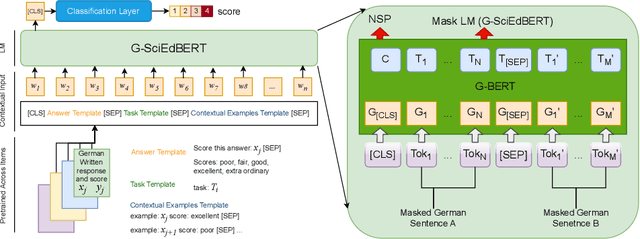Tamara Kastorff
G-SciEdBERT: A Contextualized LLM for Science Assessment Tasks in German
Feb 09, 2024

Abstract:The advancement of natural language processing has paved the way for automated scoring systems in various languages, such as German (e.g., German BERT [G-BERT]). Automatically scoring written responses to science questions in German is a complex task and challenging for standard G-BERT as they lack contextual knowledge in the science domain and may be unaligned with student writing styles. This paper developed a contextualized German Science Education BERT (G-SciEdBERT), an innovative large language model tailored for scoring German-written responses to science tasks. Using G-BERT, we pre-trained G-SciEdBERT on a corpus of 50K German written science responses with 5M tokens to the Programme for International Student Assessment (PISA) 2015. We fine-tuned G-SciEdBERT on 59 assessment items and examined the scoring accuracy. We then compared its performance with G-BERT. Our findings reveal a substantial improvement in scoring accuracy with G-SciEdBERT, demonstrating a 10% increase of quadratic weighted kappa compared to G-BERT (mean accuracy difference = 0.096, SD = 0.024). These insights underline the significance of specialized language models like G-SciEdBERT, which is trained to enhance the accuracy of automated scoring, offering a substantial contribution to the field of AI in education.
 Add to Chrome
Add to Chrome Add to Firefox
Add to Firefox Add to Edge
Add to Edge